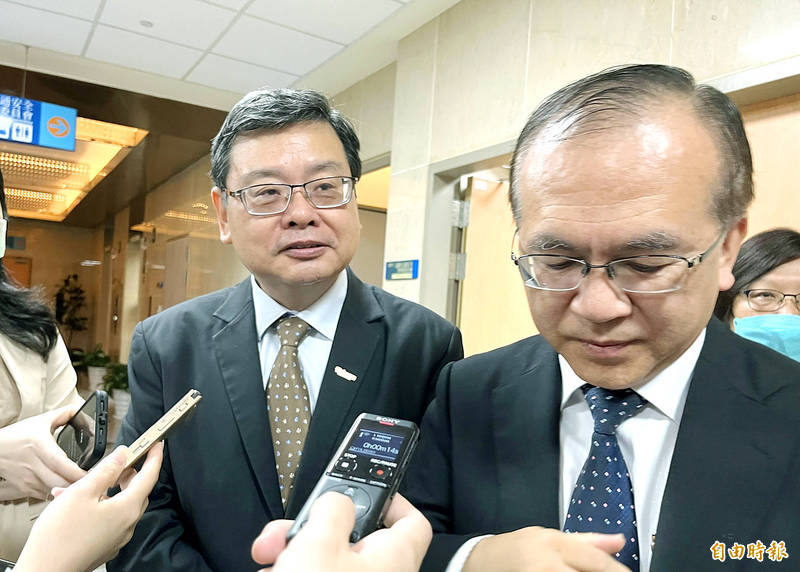《TAIPEI TIMES》Curbs on cross-strait travel may be eased: Chang

Deputy Minister of Transportation and Communications Chen Yen-po, left, and Tourism Bureau Director-General Chang Shi-chung, right, speak to reporters in Taipei yesterday. Photo: Chen Hsin-yu, Taipei Times
By Shelley Shan / Staff reporter
The Tourism Bureau yesterday said it is communicating with Chinese tourism officials about lifting a two-way travel ban that has been enforced because of the COVID-19 pandemic, adding that both sides hope to reach a consensus to remove it as soon as possible.
“Taiwan welcomes Chinese tour groups, and we are seeing positive prospects for Taiwanese tour groups to visit China. We have begun talking with Chinese officials on the issues. Both sides have high expectations about resuming two-way travel between the two countries and hope to reach a consensus soon. The faster, the better,” Tourism Bureau Director-General Chang Shi-chung (張錫聰) told reporters on the sidelines of a news conference.
To prepare for a resumption of cross-strait tourism, the bureau has revisited regulations and is offering courses for Mandarin-speaking tour guides, he said.
The COVID-19 pandemic has changed travel in China and Taiwan in the past three years, and reviewing these regulations would help travel agencies and tour guides skip the transition period, he said.
Separately, the Executive Yuan yesterday announced the launch of recruitment program to meet a surging demand in the hotel and lodging industry, with subsidies being provided by the ministries of transportation and communications, labor and education.
The government has set a goal of attracting 6 million international visitors this year. The nation on Saturday welcomed its 2 millionth tourist this year.
Hotel and lodging associations have reported a staffing shortage of about 12,000 people. Specifically, 4,400 people are needed for housekeeping and cleaning services, association data showed.
“Countries around the world are vying for international tourists in the post-pandemic era. Before the pandemic, an international tourist would spend an average of 6.2 nights in Taiwan. We need to find ways to keep the demand for lodging stable and strong to avoid losing international tourists to other countries,” Chang said.
The bureau has allocated funds to subsidize housekeeping and cleaning personnel, Chang said.
Based on the bureau’s plan, hotel and lodging providers are to receive a subsidy of NT$5,000 per month to hire new employees for housekeeping and cleaning services, provided the employees work for at least six months.
Hotels participating in the program, which retroactively began on April 1, can receive a monthly subsidy up to 12 months, the bureau said.
Funding for the program can subsidize salaries of 16,000 new workers in the industry.
Funding from the Ministry of Labor is designed to encourage the unemployed to work in housekeeping and cleaning services through direct subsidies to employees.
Generally, workers would be given an employment incentive of NT$6,000 per month for up to 12 months, with an additional NT$3,000 bonus per month if the workplace is in a remote or a designated area covered by the program.
Older workers re-entering the workforce would be given an additional NT$10,000 per month if they take on a full-time position and a bonus of NT$3,000 per month for work in remote areas, or NT$5,000 per month for a part-time position and NT$1,500 bonus for work in remote areas.
Funding from the Ministry of Education is designed to encourage students to work in the hospitality industry. Students who rack up more than 80 to 160 hours of experience working in the hotel industry would receive a monthly subsidy of NT$3,000 to NT$6,000, and a bonus of NT$3,000 per month for a maximum of three months for work in remote areas.
新聞來源:TAIPEI TIMES

















